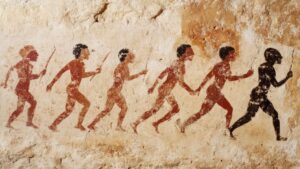“Change is the only constant in the world.”
This cliché has long drawn persisting support from people due to its truthful and apparent nature. Change is everywhere, occurring evidently from people’s point of view. Nothing ever stays unchanging, whether it’s day turning to night or traffic coming and going. From these observations and the presumption that change is the only constant, how has human nature changed?
The world constantly experiences progress and development.
People grow and step out from their current standpoint. Almost everything undergoes change in some form, and nothing stays the same as time passes. Is this enough of a basis to conclude that human nature also experiences such shifts?
Is Human Nature Changing?
Such a question doubtlessly arises whenever people dabble in the concept of change. And perhaps, there will always be debates as to whether this happens. There’s no denying the changes people undergo. It’s evident in how their features have adapted through time and how appearances change as years go by.
However, when it comes to the human psyche, the core of their essence, the nitty gritty of their existence, has human nature changed, or is it largely undisturbed?
Many philosophers, scientists, and artists – the world’s largest minds – have prompted and deduced the indifference within human nature. Regardless of the period, people have yearned for the same things, fought for similar matters, and have been displeased by relative affairs. Human nature has acted relatively familiar over centuries. They’ve always been comprised of right and wrong, light and dark, balancing between beauty, love, and pain.
Hence, there’s no wonder why the question of whether human nature changed has always been under scrutiny and divided opinions.
How Has Human Nature Changed?
Author Chet Shupe has highlighted this inquiry in his book Rediscovering the Wisdom of Human Nature. The author thoroughly discusses what he believes has shifted in how humans think and behave over time. He tackles the ever-growing perspectives as the world progresses and people are exposed to more varying concepts and systems.
In breaking these elements down, he has supported how human nature changed but prompted the idea that perhaps certain changes are against what’s supposed to happen. The book speaks urgently about rediscovering authenticity in human nature, recognizing the numerous shifts that civilization and people have brought upon themselves.
Biological Evolution
If the question were considered at a physical-level assessment, there would be a long list of points to discuss. People have constantly undergone change since time immemorial. With evolution in the picture, human nature changed in overall body and brain size, as well as reduction in proportions, as a response to ever-changing climates and lifestyles.
This factor also supports how humans have developed physical diversity over time, with the growing differences in their places of residence. While changes have gradually become miniscule, it’s undoubted how physical characteristics have continued to evolve.
Cultural Development
Much about how human nature changed over time can be attributed to how culture has also shifted. It must be remembered that the cultural and environmental background people are born into shapes their perspectives and behaviors about the world. Hence, as societies become more complex, human nature may experience the same complexities.
Cultural changes heavily influence people’s expression and how they manage their thoughts and emotions. This weighs into how they behave, impacting the knowledge they consume and the beliefs they adhere to.
Psychological Changes
When perceived as a much deeper affair, there may be more complex answers to whether human nature changed. This can still be open to argument, given certain traits remaining universal within humanity, such as their regard for each other or desire for connection. However, shifts in their psychological foundations also support the belief in humans’ ever-changing nature.
This comes with the cultural shifts the world is experiencing. With more access to information and education, humans work on a significantly different cognitive framework compared to the past. They have utilized various approaches when interacting with each other and have improved how they express themselves. Without a doubt, a slight change in communities brings more significant changes in human nature.
Technological Impact
There’s no denying how technology has influenced people’s lifestyles. While many might think this has only affected people’s routines, technology has changed more of the human essence. It has transformed how people interact, altering how they communicate and the social dynamics they’ve long established.
With the accessibility of technology, people have also been introduced to more information and knowledge, influencing how they think and engage with those around them.
Values and Ethics
Human nature changed societal values as people adhere to the changes in their culture.
Depending on the period they’re in, movements for equality and measures of human rights face gradual shifts to accommodate the ever-evolving times. This posits how people commonly absorb ethics and morality depending on how they’re taught or exposed to them.
These and more are examples of how human nature changed over time. As the world continues to embrace progress and development, who’s to say people won’t continue to adjust their beliefs and preferences according to the times they’re in?
If you’re interested in reading more about how human nature has changed according to the words of Chet Shupe, grab a copy of his book Rediscovering the Wisdom of Human Nature.













